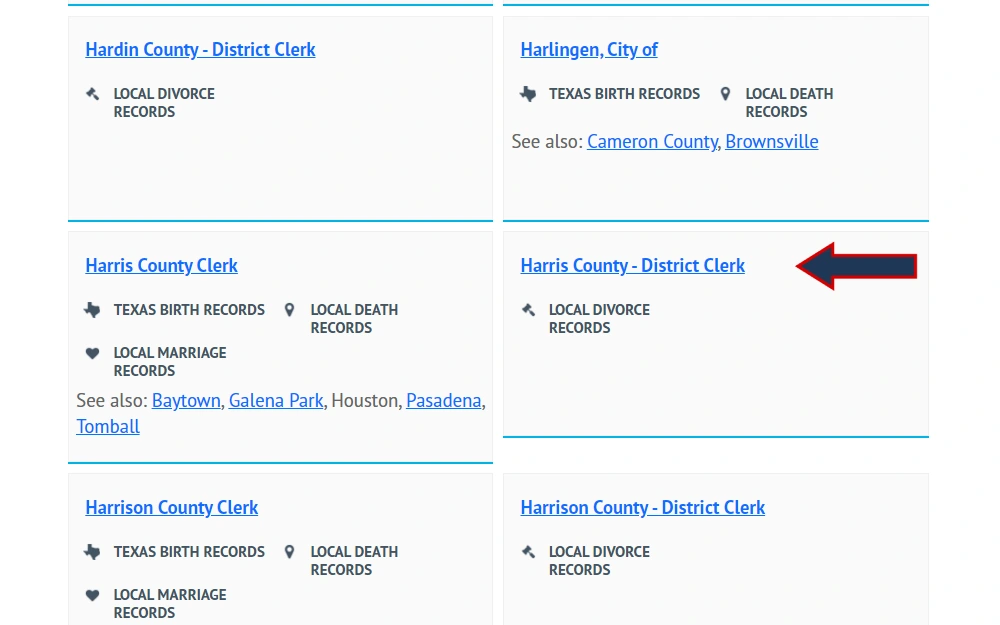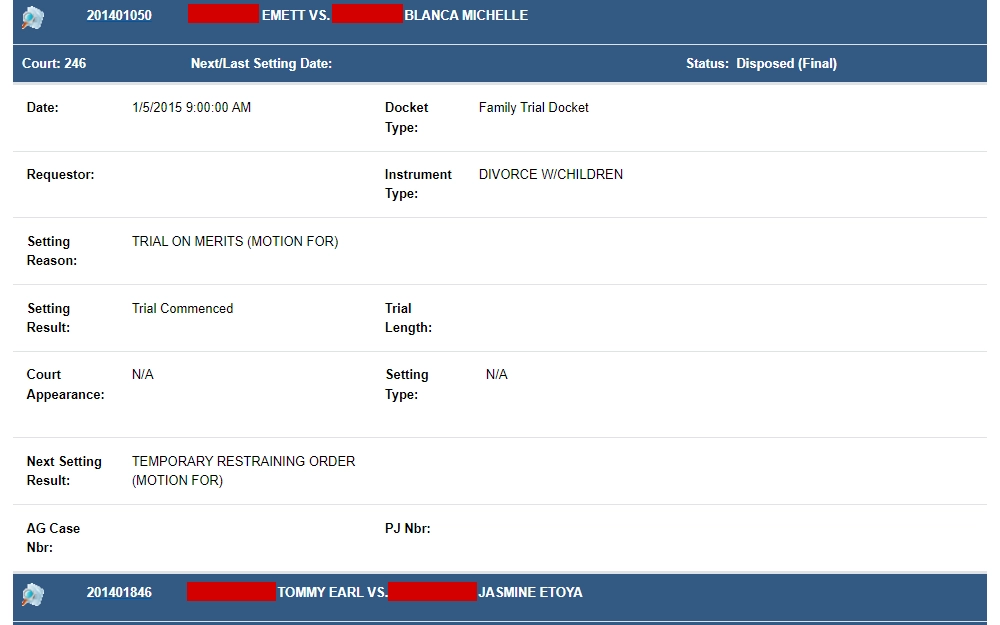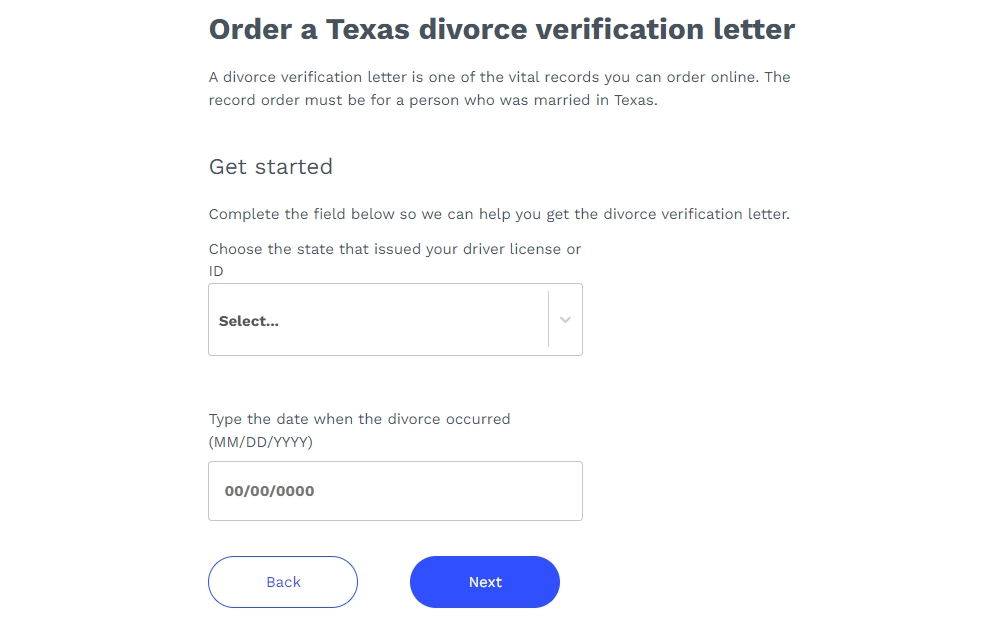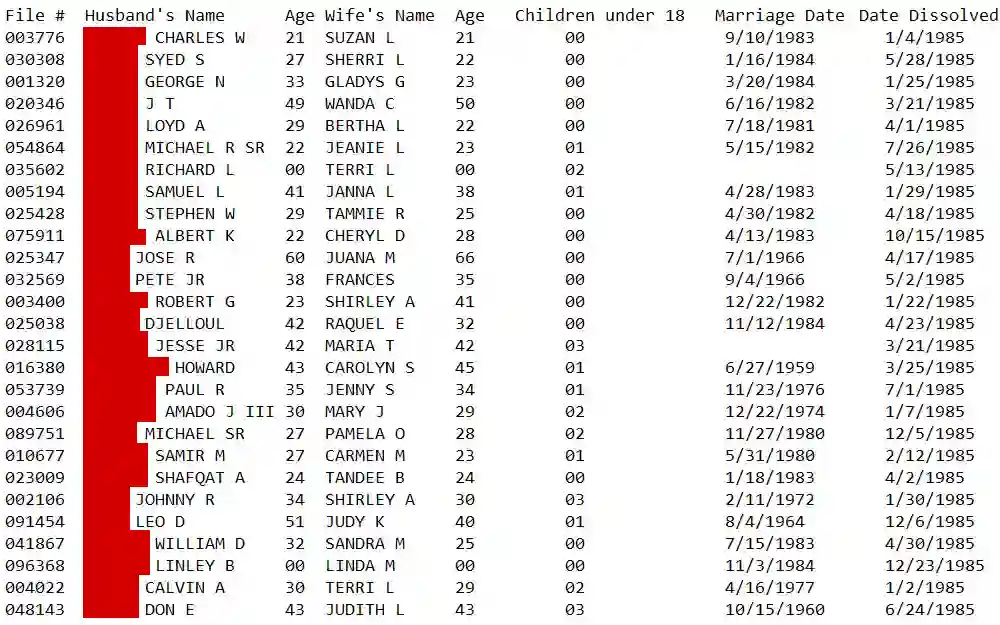View Harris County divorce records for free in minutes. As a result of state law, you have a right to view and inspect these records, which are available through various resources and can be accessed online and in person.
Divorce records are considered public information and can be used to learn more about the marital history of a friend, neighbor or colleague. They may also be needed for proof when applying for a marriage license or for other legal or business reasons.
This article will walk you through how to search for divorce records in Harris County, Texas, for free.
This resource was written by Attorney Robert Bailey Jr, who holds a Juris Doctorate from Widener University School of Law.
How Do I Look Up Free Harris County Divorce Records?
If you want to perform a search for public divorce records in Harris County, you will have to do so through the record custodian, the District Clerk’s Office.1 The District Court handles family law cases in Harris County and also manages those records.

The Harris County District Clerk has an online case record search tool to access family law cases, including divorce records.3 While this is a free tool, it first requires you to sign up for an account before you can conduct your first search. Once you create an account and log in, you can then click on the online services tab and select docket search.
From there you can perform a search of their combined civil and family law cases.
When using the online search tool, under the “case type” drop-down menu, you can either select divorce or divorce with children. For past divorce records, you will want to select “Disposed (Final)” for the case status. You can then enter either party’s name or the case number.
Lastly, you can set a date range for when the divorce was filed to further narrow down your results.
On the results page you will be able to view all matching divorce records results. The summary information will provide you with the case number, party names, file date, court case region and the type of action. Under the type of action, you can see whether or not the parties to the divorce had any children.

To view the complete online divorce record, click on the party names. Here, you can view divorce information compiled into several different sections. The summary section will provide you with general case information, such as the case disposition and when the petition for divorce was filed.
The parties section provides the names of both individuals and the attorney that represented each of them.
There is a court costs section as well as a chronological listing of all events in the divorce case from when the petition was filed to the final decree. The online public divorce record even contains a section on child support as well as images of certain documents that were filed during the case, including the petition and final decree issued by the judge.
The online search tool also gives you the option to purchase available divorce records that you found. The fee for these records is $1.00 per page if printed and $5.00 for each certified document. For an electronic copy, the cost is $1.00 for up to ten pages and a ten cent per page rate if the document is eleven pages or greater.
To send a request by mail, you will have to provide sufficient information for the District Clerk to access the record. This information should include the case number and the persons involved in the divorce case. You can provide this information and the appropriate fee to the address below:
Harris County Clerk
P.O. Box 1525
Houston, Texas 77251
If you are submitting a request by mail, make sure that your fee is either provided by a check (no personal checks allowed) or money order and that it is made payable to the Harris County Clerk. You can also submit credit card information for a request by mail, but there is a 4% surcharge if you use this option.
Another option to request a divorce record is to use one of their public kiosks located on-site at the district clerk’s office. To do so, you can go to the address below:
Harris County District Clerk
201 Caroline St., Ste. 420
Houston, Texas 77002
If you have any additional questions about requesting a divorce record from the Harris County District Clerk, you can contact them by phone at 832-927-5800. They are available to answer your questions any time from 8:00 AM to 4:30 PM, Monday through Friday.
In some situations, you can also access divorce records through city and town government agencies in larger locales throughout the county. This is not an option in Harris County, as divorce records are solely maintained by the District Clerk.
How To Run a Texas Divorce Records Search via the Department of State Health Services Vital Statistics Office
For whatever reason, you may need to expand your search of divorce records to the entire state of Texas. While you have the option to search each county individually, there are broader options that can provide you with this information more efficiently.
The primary option is to request a divorce verification through the Texas Department of State Health Services Vital Statistics Section.4 While this is not the actual decree or certificate, it does provide verifiable proof that a party obtained a divorce in Texas. There are a few different options for submitting a request.
Regardless of the option you choose, the fee for this service is $20.00 per copy.
The quickest option is to submit a divorce verification request online, which you can submit within a few minutes.5 Alternatively, you can complete the physical application for a divorce record. Both the online and physical application will require you to provide the name of both individuals who were divorced.

You will also need to indicate when and where the parties were divorced. Lastly, you will provide your contact information and your connection to the parties listed on the record. Only the following types of qualified individuals (besides the people listed on the record) are allowed to request a divorce verification letter:
- Parents
- Guardians
- Children
- Spouse
- Grandparents
- Sibling
- A person with legal proof of tangible interest (including a court order)
- Legal Representative
If you filled out a hard copy of the application, you can either bring it to any authorized local office or send it in the mail to the address below:6
Texas Vital Statistics
Department of State Health Services
P.O. Box 12040
Austin, Texas 78711
A quick way to look for marital information is to search through divorce indexes. The Vital Statistics Section provides a year-by-year divorce index for the entire state of Texas, starting in 1968.7 These indexes are available to the entire public and contain basic information submitted by the county district clerks throughout Texas.
The indexes will provide you the full name and age of both individuals that were divorced along with the date they were married and the number of children under 18. In addition, you can get the date of divorce and the county that issued the decree. Lastly, you can view the file number, which can be helpful for furthering your research at the county level.

For any questions about these marriage indexes, feel free to send an email to [email protected]. For questions relating to any request for records or verification, you can take a look at their marriage record FAQ page or call them at 888-963-7111.9 They are available for inquiries from 8:00 AM to 4:00 PM, Monday through Friday.
These records also include people who were divorced from a common-law marriage. Texas recognizes common-law marriage under certain conditions. Common law divorce, while not a legal term, is when people dissolve their informal marriage that was recognized under Texas law.
Can Anyone View Divorce Records in Harris County Texas?
While you know the process for accessing these divorce records, it’s important to understand any nuances involved. The first question that needs to be answered is whether anyone can view these divorce records or whether it is restricted to a group of people. Through the Public Information Act Texas has provided a general authorization that all citizens can inspect and copy divorce records.10
However, there is almost always an exception to the rule, and the same holds true for divorce records. One exception is sensitive information. Sensitive information can be marked as such to avoid it being disclosed with the rest of a divorce record.
Examples of sensitive information include personal information about minors, bank account information and social security numbers.
In certain limited situations, a judge may honor a request to have a divorce record completely sealed. This occurs when a motion is approved that provides adequate justification about the harm that would come from releasing the information while also providing a rationale for why it would not be harmful to the general public if this information is withheld.
Beyond these exceptions, divorce records are generally available. That being said, there is more than one type of divorce record, and it’s important to understand the difference.
Divorce Papers: This can include anything from the documents filed to initiate the divorce to general information about the dissolution.
Divorce Certificate: This is a document that can provide a summary of a divorce, including where and when it occurred.
Divorce Decree: This is the final document signed off by the judge that makes a divorce official. It also provides the results of the divorce, including how the marital property will be divided, child and spousal support, and any other requirements for either party.
All of these documents are generally available to the public, although it does not mean they can all be accessed the same way. For instance, a decree or certificate usually requires a formal request to the district clerk who issued the divorce.
Also, while non-certified records can be accessed informally, you will have to make a specific request for a certified record. Certified records can be used for business or legal reasons as official proof of a divorce.
You might want to consider using a third-party provider if you are having issues with accessing a particular divorce record. They may be able to find records when you’re not sure where the record is located or cannot find a document for other reasons. While some of these third-party providers are endorsed by government agencies, those that are not can only provide you documentation for informational purposes.
With the information detailed in this article, the divorce record you need is at your fingertips. Use the information provided above to determine what type of Harris County divorce records you need and how to access them.
References
1Harris County District Clerk. (n.d.). Office of Harris County District Clerk – Marilyn Burgess | Contact Information. Retrieved December 27, 2023, from <https://www.hcdistrictclerk.com/common/criminal/ContactInformation.aspx>
2Texas Department of State Health and Human Services (DSHS). (n.d.). Local Vital Record Offices – H. Texas DSHS. Retrieved December 27, 2023, from <https://www.dshs.texas.gov/vital-statistics/order-records-locally/local-vital-record-offices-4>
3Harris County District Clerk. (n.d.). Office of Harris County District Clerk – Marilyn Burgess | Search Our Records. Retrieved December 27, 2023, from <https://www.hcdistrictclerk.com/edocs/public/search.aspx>
4Texas Department of State Health and Human Services. (n.d.). Marriage and Divorce Records. Texas DSHS. Retrieved December 27, 2023, from <https://www.dshs.texas.gov/vital-statistics/marriage-divorce-records>
5Texas Department of State Health and Human Services. (n.d.). Divorce Verification Letter | DSHS Official Application. Order Vital Records. Retrieved December 27, 2023, from <https://ovra.txapps.texas.gov/ovra/order-divorce-verification-letter>
6Texas Department of State Health and Human Services (DSHS). (n.d.). Order Records Locally. Texas DSHS. Retrieved December 27, 2023, from <https://www.dshs.texas.gov/vital-statistics/order-records-locally>
7Texas Department of State Health and Human Services. (n.d.). Marriage/Divorce Indexes. Texas DSHS. Retrieved December 27, 2023, from <https://www.dshs.texas.gov/vital-statistics/marriage-divorce-records/marriage-divorce-indexes>
8Texas Department of State Health and Human Services. (2000, April 27). DIV85. Retrieved December 27, 2023, from <https://www.dshs.texas.gov/sites/default/files/vs/marr-div/indexes/div/div85.zip>
9Texas Department of State Health and Human Services. (n.d.). Marriage and Divorce FAQs. Texas DSHS. Retrieved December 27, 2023, from <https://www.dshs.texas.gov/vital-statistics/frequently-asked-questions/marriage-divorce-faqs>
10Texas Comptroller of Public Accounts. (n.d.). The Public Information Act. Texas Comptroller. Retrieved December 27, 2023, from <https://comptroller.texas.gov/about/policies/open-records/public-information-act.php>
